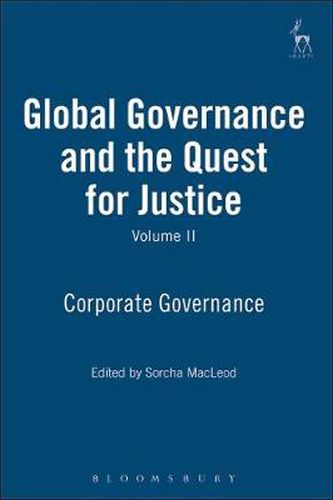Readings Newsletter
Become a Readings Member to make your shopping experience even easier.
Sign in or sign up for free!
You’re not far away from qualifying for FREE standard shipping within Australia
You’ve qualified for FREE standard shipping within Australia
The cart is loading…






This book - one in the four-volume set, Global Governance and the Quest for Justice - focuses on the role of corporations in an increasingly globalised world.
Against the backcloth of perceived abuse of corporate power - alleged violations of human rights, degradation of the environment, abuse of labour, Enron-style financial scandals, and the like - the chapters in this collection examine the nature and function of the corporation as well as the way in which we should understand corporate governance and the power of transnational corporations. Central to the question is the issue of accountability, as well as the questions of social and environmental responsibility - here the authors ask whether corporations should be more accountable relative to the broader public interest, and suggest that public law approaches to accountability may offer a way forward. Consideration is also given to the most appropriate regulatory locus (local, regional, or international) and the most effective form of response to the deficit in corporate responsibility and the abuse of corporate power. For example, are transnational corporations most effectively regulated internationally (e.g., by the United Nations), regionally (e.g., by the EU or NAFTA) or locally (e.g., through stringent reporting requirements and implementation of triple bottom line standards)?
$9.00 standard shipping within Australia
FREE standard shipping within Australia for orders over $100.00
Express & International shipping calculated at checkout
This book - one in the four-volume set, Global Governance and the Quest for Justice - focuses on the role of corporations in an increasingly globalised world.
Against the backcloth of perceived abuse of corporate power - alleged violations of human rights, degradation of the environment, abuse of labour, Enron-style financial scandals, and the like - the chapters in this collection examine the nature and function of the corporation as well as the way in which we should understand corporate governance and the power of transnational corporations. Central to the question is the issue of accountability, as well as the questions of social and environmental responsibility - here the authors ask whether corporations should be more accountable relative to the broader public interest, and suggest that public law approaches to accountability may offer a way forward. Consideration is also given to the most appropriate regulatory locus (local, regional, or international) and the most effective form of response to the deficit in corporate responsibility and the abuse of corporate power. For example, are transnational corporations most effectively regulated internationally (e.g., by the United Nations), regionally (e.g., by the EU or NAFTA) or locally (e.g., through stringent reporting requirements and implementation of triple bottom line standards)?